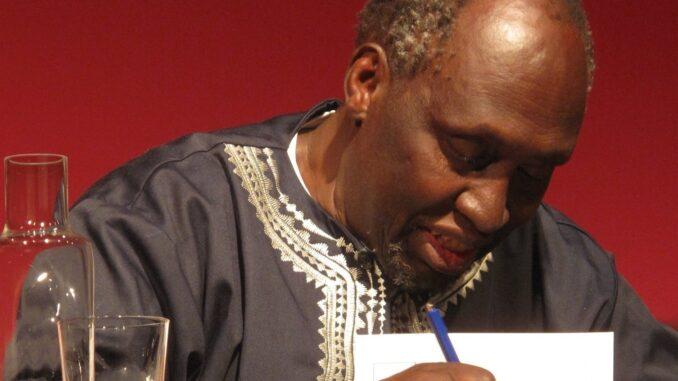
Last Updated on by Sabina
Ngugi wa Thiong’o Biography
Ngugi wa Thiong’o is a renowned Kenyan writer and academic. He was born in Kamiriithu, near Limuru, in colonial Kenya. Ngugi wa Thiong’o is known for his significant contributions to African literature and his advocacy for cultural and linguistic decolonization.

In the 1970s, Ngugi wa Thiong’o started writing in his native Gikuyu language. A decision motivated by his desire to promote African languages and challenge the dominance of colonial languages in African literature. This linguistic shift resulted in influential works such as “Caitaani Mutharaba-Ini” (Devil on the Cross) and “Matigari.”
During the late 1970s, Ngugi wa Thiong’o’s activism. And criticism of the Kenyan government led to his arrest and subsequent exile. He spent many years living in the United States and the United Kingdom, where he continued writing and teaching. It was during this time that he published works like “Decolonising the Mind” and “Wizard of the Crow.”
Ngugi wa Thiong’o’s literary achievements and intellectual contributions have garnered international recognition. He has received numerous awards and honors. Including the Lotus Prize for Literature, the Nonino International Prize for Literature, and the National Book Critics Circle Award. His works have been translated into multiple languages and continue to resonate with readers worldwide.
Beyond his literary endeavors, Ngugi wa Thiong’o is also a prominent academic. He has held teaching positions at universities such as Yale, New York University, and the University of California, Irvine. His scholarship has focused on African literature, postcolonial studies, and the intersection of culture and politics.
Ngugi wa Thiong’o’s legacy extends beyond his written works. His commitment to African languages, cultural identity, and social justice has inspired generations of writers and intellectuals across the globe. He remains an influential figure in the literary world. Actively contributing to the discourse on decolonization, African literature, and the power of language.
Ngugi wa Thiong’o Age
Ngugi wa Thiong’o was born on January 5, 1938 Kamiriithu, near Limuru, in colonial Kenya. He is 85 years old.
Ngugi wa Thiong’o Early Life
Ngugi wa Thiong’o, born on January 5, 1938, in Kamiriithu, near Limuru, Kenya. Had a humble and culturally rich early life. Growing up in a predominantly agricultural community. He was exposed to the traditional Gikuyu culture and language, which had a profound influence on his later works.
Ngugi wa Thiong’o’s parents were peasants. And their economic struggles shaped his understanding of the social and political dynamics of colonial Kenya. From an early age, he experienced the inequalities and injustices perpetuated by the colonial system. Which left a lasting impression on his worldview.
Ngugi wa Thiong’o Education
As a child, Ngugi wa Thiong’o attended a local missionary school, where he received a Western-style education. The school exposed him to English literature, sparking his interest in storytelling and writing. He was captivated by the power of language and its ability to convey narratives and shape perceptions.
After completing his primary education, he went on to study at the prestigious Alliance High School in Kikuyu, Kenya. It was during his time at Alliance that his passion for writing and literature blossomed. He actively participated in literary and drama clubs, honing his creative skills and exploring various artistic forms.
Upon graduating from high school, Ngugi wa Thiong’o furthered his education at Makerere University College in Uganda. There, he immersed himself in the study of English literature and engaged in intellectual discussions with fellow students and scholars. This period marked a crucial phase in his development as a writer and thinker.
During his time at Makerere, Ngugi wa Thiong’o began writing and publishing his early works. He delved into themes of social injustice, cultural identity, and the impact of colonialism on African societies. His experiences growing up in a colonized country and his deep connection to his Gikuyu heritage greatly influenced the direction of his writing.
Ngugi wa Thiong’o’s early life experiences and education provided a foundation for his later literary and academic pursuits. The exposure to both Western literature and his native Gikuyu culture shaped his unique perspective, ultimately leading him to become one of Africa’s most celebrated and influential writers.
Ngugi wa Thiong’o Family
Ngugi wa Thiong’o was born to parents who were peasants in Kamiriithu, near Limuru, Kenya. However, specific information about his parents’ names or backgrounds is not readily available in my training data.
Limited information is accessible regarding Ngugi wa Thiong’o’s siblings, but it is known that he had at least one brother named Good Wallace Ngugi, who was also involved in the arts. Good Wallace Ngugi pursued a career in acting and gained recognition for his performances in Kenyan television and film. The details about Ngugi wa Thiong’o’s family are not extensively documented, but it is clear that his upbringing and the community he grew up in significantly shaped his worldview and literary perspective.
Ngugi wa Thiong’o Net worth
Thiong’o’s net worth is estimated to be at $60 million.
Ngugi wa Thiong’o Books
Ngugi wa Thiong’o is a prolific writer who has authored numerous books spanning various genres. Here are some of his notable works:
- “Weep Not, Child” (1964)
- “A Grain of Wheat” (1967)
- “Petals of Blood” (1977)
- “Caitaani Mutharaba-Ini” (Devil on the Cross) (1980)
- “Wizard of the Crow” (2006)
- “Decolonising the Mind: The Politics of Language in African Literature” (1986)
- “In the House of the Interpreter” (2012)
These are just a few examples of Ngugi wa Thiong’o’s extensive literary contributions. His writings delve into issues of identity, colonialism, social justice, and the power of language, leaving a profound impact on African literature and global literary discourse.
Ngugi wa Thiong’o Awards
Ngugi wa Thiong’o, throughout his illustrious career, has received numerous awards and honors for his exceptional contributions to literature. Some of the notable awards and recognitions he has received include:
Lotus Prize for Literature (1973): He was honored with the prestigious Lotus Prize for Literature, which recognizes outstanding literary achievement.
Nonino International Prize for Literature (2001): He was awarded the Nonino International Prize for Literature in recognition of his significant contributions to world literature.
National Book Critics Circle Award (1987): Ngugi wa Thiong’o’s work “Matigari” was a finalist for the National Book Critics Circle Award, a prominent literary award in the United States.
Tucholsky Prize (2009): The Swedish PEN awarded him the Tucholsky Prize for his commitment to freedom of expression and his fearless advocacy for human rights.
Fonlon-Nichols Award (2009): This award, given by the African Literature Association, honored Ngugi wa Thiong’o for his remarkable contributions to African literature.
Park Kyong-ni Prize (2012): He received the Park Kyong-ni Prize in recognition of his immense literary achievements and his dedication to portraying the African experience.
Nicolás Guillén Lifetime Achievement Award (2014): This award, presented by the Caribbean Philosophical Association, acknowledged his outstanding contributions to literature and his tireless efforts to promote social justice and cultural awareness.
These awards and accolades reflect the high esteem and recognition that wa Thiong’o has earned both within Africa and on the global literary stage. His works continue to inspire and resonate with readers, and his contributions to literature and social activism have solidified his status as one of the most influential and celebrated writers of his generation.
Ngugi wa Thiong’o Imprisonment
Ngugi wa Thiong’o faced imprisonment during his involvement in political activism and his outspoken criticism of the Kenyan government. In 1977, during a period of political unrest in Kenya, he was arrested and detained without trial. His arrest was primarily due to his play “Ngaahika Ndeenda” (I Will Marry When I Want), which he co-authored with Ngugi wa Mirii.
The play, which explored themes of social and economic inequality and challenged the ruling elite, drew attention from the government, who deemed it subversive. Ngugi wa Thiong’o’s arrest was seen as an attempt to silence his dissent and stifle his influence on the political and cultural landscape.
While in prison, Ngugi continued to write, using scraps of paper and other materials at his disposal. He wrote his novel “Devil on the Cross” (originally titled “Caitaani Mutharaba-Ini”) in Gikuyu during his time behind bars. This act of defiance and commitment to his literary vision demonstrated his resilience in the face of adversity.
After serving over a year in prison, he was released in 1978 following international pressure and advocacy on his behalf. However, he was forced into exile for fear of further persecution. He spent the next several years living in the United States and the United Kingdom, continuing his writing and activism from abroad.
The period of Ngugi wa Thiong’o’s imprisonment was a significant chapter in his life and further solidified his reputation as a courageous writer and advocate for social justice. His experiences during this time influenced his subsequent works, which continued to address themes of oppression, colonialism, and the struggle for freedom.


